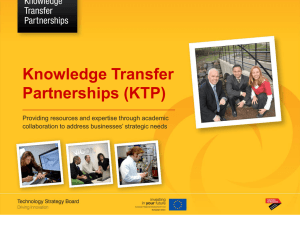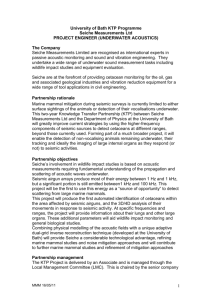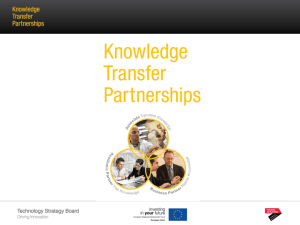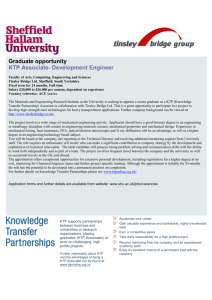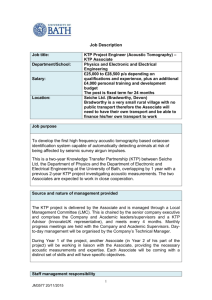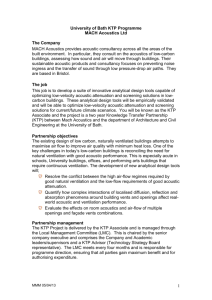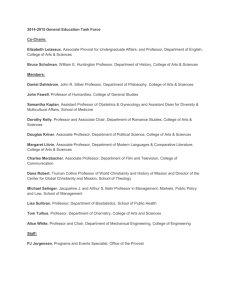Background Information
advertisement
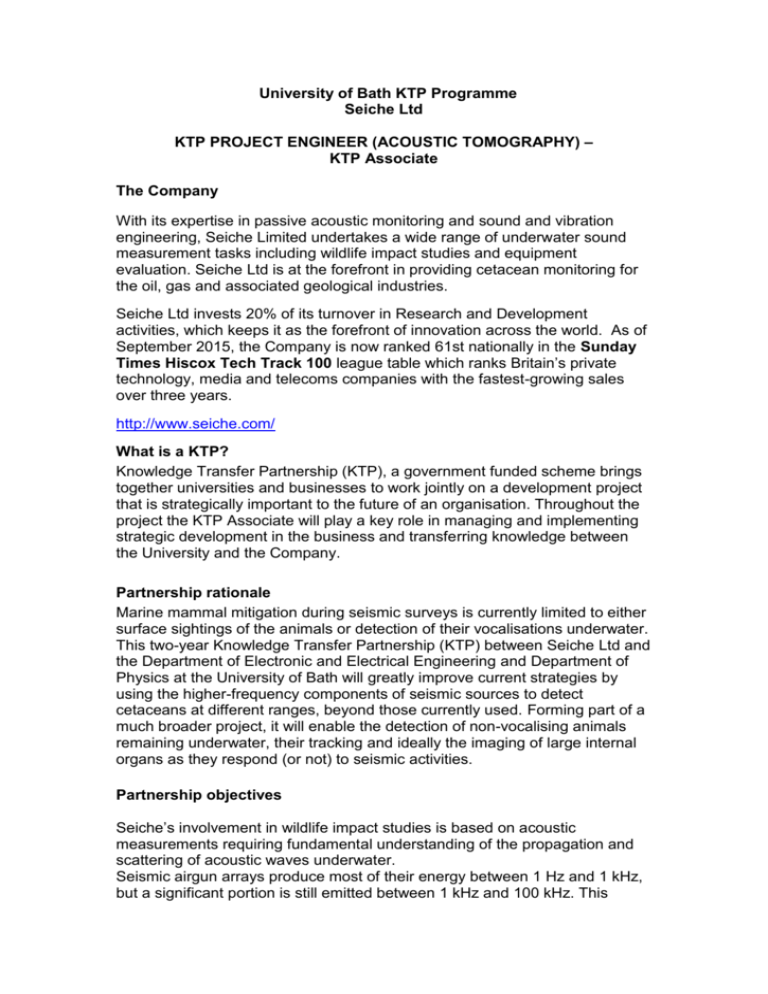
University of Bath KTP Programme Seiche Ltd KTP PROJECT ENGINEER (ACOUSTIC TOMOGRAPHY) – KTP Associate The Company With its expertise in passive acoustic monitoring and sound and vibration engineering, Seiche Limited undertakes a wide range of underwater sound measurement tasks including wildlife impact studies and equipment evaluation. Seiche Ltd is at the forefront in providing cetacean monitoring for the oil, gas and associated geological industries. Seiche Ltd invests 20% of its turnover in Research and Development activities, which keeps it as the forefront of innovation across the world. As of September 2015, the Company is now ranked 61st nationally in the Sunday Times Hiscox Tech Track 100 league table which ranks Britain’s private technology, media and telecoms companies with the fastest-growing sales over three years. http://www.seiche.com/ What is a KTP? Knowledge Transfer Partnership (KTP), a government funded scheme brings together universities and businesses to work jointly on a development project that is strategically important to the future of an organisation. Throughout the project the KTP Associate will play a key role in managing and implementing strategic development in the business and transferring knowledge between the University and the Company. Partnership rationale Marine mammal mitigation during seismic surveys is currently limited to either surface sightings of the animals or detection of their vocalisations underwater. This two-year Knowledge Transfer Partnership (KTP) between Seiche Ltd and the Department of Electronic and Electrical Engineering and Department of Physics at the University of Bath will greatly improve current strategies by using the higher-frequency components of seismic sources to detect cetaceans at different ranges, beyond those currently used. Forming part of a much broader project, it will enable the detection of non-vocalising animals remaining underwater, their tracking and ideally the imaging of large internal organs as they respond (or not) to seismic activities. Partnership objectives Seiche’s involvement in wildlife impact studies is based on acoustic measurements requiring fundamental understanding of the propagation and scattering of acoustic waves underwater. Seismic airgun arrays produce most of their energy between 1 Hz and 1 kHz, but a significant portion is still emitted between 1 kHz and 100 kHz. This project will be the first to use this energy as a “source of opportunity” to detect scattering from large marine mammals. This project will produce the first automated identification of cetaceans within the area affected by seismic airguns, and the 3D/4D analysis of their movements in response to seismic activity. At specific frequencies and ranges, the project will provide information about their lungs and other large organs. These additional parameters will aid wildlife impact monitoring and general biological studies. Combining physical modelling of the acoustic fields with a unique adaptive dual-grid inverse reconstruction technique (developed at the University of Bath) will provide Seiche Ltd a considerable technological advantage, refining marine mammal studies and noise mitigation approaches and will contribute to further marine mammal studies and refinement of mitigation approaches Partnership management The KTP Project is delivered by an Associate and is managed through the Local Management Committee (LMC). This is chaired by the senior company executive and comprises the Company and Academic leaders/supervisors and a KTP Advisor (InnovateUK representative). The LMC meets every four months and is responsible for programme direction, ensuring that all parties gain maximum benefit and for authorising expenditure. Associates are expected to prepare an executive summary, to report on progress for the LMC meeting and this must be circulated in advance to LMC members. They are also expected to make a formal presentation on some aspects of their work at this meeting. The academic knowledge base will be provided by two academics from the University of Bath, Dr Manuchehr Soleimani from the Department of Electronic and Electrical, expert in tomographic imaging and Dr Philippe Blondel from the Department of Physics, expert in underwater acoustics. A monthly progress meeting is held with the Company and Academic Supervisors. The Associate is expected to arrange and document these meetings. The Associate is required to maintain a log of the tangible benefits of the project and to provide internal seminars for other members of University and Company staff, based on knowledge acquired through attendance at courses and conferences. The ideal candidate will: Have a PhD in Physics, Applied Mathematics, Computer Science, Engineering, or other appropriate subject Experience of working in multi-disciplinary project teams to agreed project plans and specifications. Possess a strong software or mathematics background with previous industrial or research project experience in inverse problems and/or image/signal processing and/or a background in electromagnetism/acoustics. Need the ability to rapidly fill knowledge gaps and have the confidence to quickly assess the most promising solutions. In Year 1, they will work in close collaboration with another KTP Associate, already in place, who will assist in the forward-problem part of the project. Have the ability and desire to lead and undertake commercial technical development within the Company. Show proven experience of programming skills in a high-level language such as Matlab or C. Be an excellent communicator, both written and verbal. Possess a desire to control their own project and follow through without continual supervision. Be able to turn their hand to the requirements arising in a small engineering company and work flexibly within the team. Demonstrate they have, or could rapidly acquire, the ability to undertake the software development of 3D/4D image reconstruction and acoustic inversion algorithms. Demonstrate they have, or could rapidly acquire, the data interpretation skills to validate the complex scattering models and use Associate 1’s output data. The post is fixed term for the duration of 24 months. KTP Associate – The benefits Accelerate your career Gain valuable experience and marketable, highly transferable skills Take early responsibility for a high profile project Receive mentoring from the company and an experienced academic team Opportunity to gain a professional qualification Receive practical and formal management training and development Enjoy an excellent chance of a permanent post with the company Further information about KTPs and the advantages of being a KTP Associate can be found at http://ktp.innovateuk.org/ Associate’s expectation The Associate will have the opportunity to pursue another higher degree as a member of staff of the University. Bath provides an MPhil in Knowledge Transfer specifically for KTP Associates. The Associate will be encouraged to gain membership of a relevant professional body to enable them to work towards Chartered status. They may undertake several selected course activities as well as general courses at the University as a member of staff. Within the limits of commercial confidentiality, the Associate will have the opportunity to deliver papers at conferences and will be expected to co-author articles. On successful completion of the project, it is likely that the Associate will be offered a permanent position with the company. However, if due to unforeseen circumstances this is not possible, the Associate will still have acquired invaluable commercial experience through close involvement with the senior management of the company. Experience of project management will be gained, as well as knowledge of the daily running of a successful international business. Furthermore the Associate will develop expertise in all aspects of remote sensing systems that will enhance future employment prospects Salary and conditions of employment The salary is £25,000 - £28,500 pa depending on qualifications and experience and the reward package includes a pension contribution and separate £4,000 personal training and development budget. The Associate will be appointed by the University as a member of staff with the Department of Electronic and Electrical Engineering and the Department of Physics, responsible to the appointed academic supervisor. The contract of employment is for 24 months. There is a probationary period of six months, during which time the contract may be terminated by either side with one month’s notice. Thereafter, the required notice period to be given by either side is three months. The University requires a mid-probationary report after three months and a full probationary report at six months. In other respects the Associate will be treated as a company employee and works full-time at the Company’s premises at Bradworthy in Devon. Bradworthy is a very small rural village with no public transport therefore the Associate will need to have their own transport and be able to finance his/her own transport to work. The project may require some periods of time to be spent at the University and could involve overseas travel. The conditions of work, including work hours and holiday entitlement, will be those applying to Company employees. An annual appraisal is carried out with the Academic and Company Supervisors. This is used to identify the Associate’s training requirements in relation to programme tasks and their personal development plan. Whilst there is no commitment on the company to retain the Associate at the end of the programme, it is expected that the Associate will be made aware of future prospects at their 18-month appraisal. KTP appointments cannot normally be extended beyond the end of the project. It should be noted that this KTP Associate post entails the development and application of knowledge for commercial outcome and that the Associate will be embedded in the company for the KTP duration. It is technology transfer focussed and not suitable for candidates primarily seeking an academic research or teaching career within the University.
